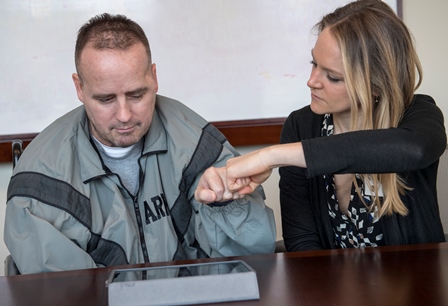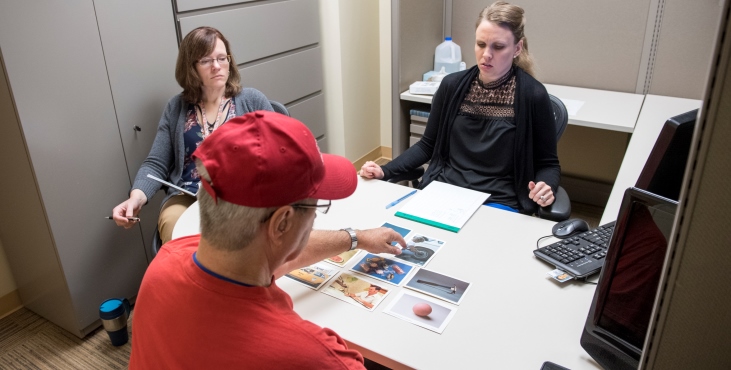VA Pittsburgh Healthcare System in 2018 will train six speech-language pathologists from six different VA health care facilities in its one-of-a-kind, intensive aphasia treatment program.
Aphasia is a language disorder caused by brain damage, often following a stroke. It impairs a person’s ability to understand, speak, read and/or write, but does not affect intelligence.
The six pathologists will complete the five-week Pittsburgh Aphasia Rehabilitation Training Network and Residency (PARTNeR), which pairs them with Veterans enrolled in VA Pittsburgh’s Program for Intensive Residential Aphasia Treatment and Education, or PIRATE.
PIRATE provides Veterans 20 days of one-on-one speech language treatment and personalized aphasia education. It also supports and encourages Veterans to become self-advocates for increasing aphasia awareness in their communities. The treatment is available to Veterans and active duty service members.
“There are no other programs like PIRATE in VA, but there are similar programs in the U.K., Canada and Australia,” said Patrick Doyle, Ph.D., VA Pittsburgh’s Audiology and Speech Pathology Program director. Doyle also noted comparable programs are non-existent in private-sector U.S. health care.
Doyle said the primary motivation in creating training for providers was to increase access to care and to improve patient outcomes in aphasia rehabilitation throughout VA. Two residents completed their rotations in May.

Speech language pathologist Elizabeth Starling and Army Veteran Jeffrey Stolz celebrate his progress with a fist bump during an aphasia therapy session.
“By studying the process of evaluation and treatment, as well as the intensive nature of therapy services provided within the context of the PIRATE program, I hope to advance the level of services provided within my own VA system,” said Sarah Kiefer Luhring, a pathologist at the Cincinnati VA Medical Center. Luhring said VA Pittsburgh leads VA in its interest, research and advocacy for Veterans with aphasia.
The other pathologist who completed the training, Elizabeth Starling of the VA Tennessee Valley Healthcare System’s Nashville campus, expressed similar goals.
“I will make a concerted effort to increase intensity of aphasia treatment at the Nashville VA after reading the evidence and seeing the profound impact on gains in treatment at the Pittsburgh facility,” said Starling, who also serves as clinical supervisor for graduate students and clinical fellows. “I do believe that it is possible to make adjustments in our scheduling and time allotments to provide increased intensity of treatment…to make real improvements in our care.”
Starling’s experience during the residency also struck her on a personal note.
“I loved watching the camaraderie build between the Veterans with aphasia who attend the PIRATE program, as they are able to communicate and bond with other people who understand what they are going through,” Starling said.
Two more sessions of PARTNeR with two residents each are scheduled for the remainder of 2018. Each will coincide fully with one of VA Pittsburgh’s PIRATE iterations.
Future PARTNeR scholarships will depend on funding availability.
“The funds for this initiative were obtained through a Geriatric Research Education and Clinical Center educational expansion grant. There is a dire need for both specialty training for providers and alternative models of service delivery to improve access to care and clinical outcomes in this underserved population,” Doyle said.
Doyle estimates approximately 100,000* U.S. Veterans older than 55 have aphasia, and approximately 20,000 of them are enrolled in VA health care. Aphasia’s far-reaching consequences affect psychosocial adjustment, family role participation and the ability to function independently in society.
Learn more about VA Pittsburgh’s PIRATE program at www.pittsburgh.va.gov/pirate/.
Sheila Tunney is a public affairs specialist at VA Pittsburgh Healthcare System. She is an Army Veteran.
Topics in this story
More Stories
Veteran Byron Potier weighed almost 300 pounds and was tired and lethargic. He was the perfect candidate for gastric sleeve surgery.
How much do you know about VA care, benefits and services? Don’t miss out on what you've earned—check out the "2025 VA Federal Benefits Guide for Veterans, Dependents, Survivors, and Caregivers" handbook to learn more.
Feeling stressed? Your breath can help you relax and focus. Take 3 minutes to reset and prioritize your well being for this week's #LiveWholeHealth practice.







PIRATE Program helped me I highly recommend this